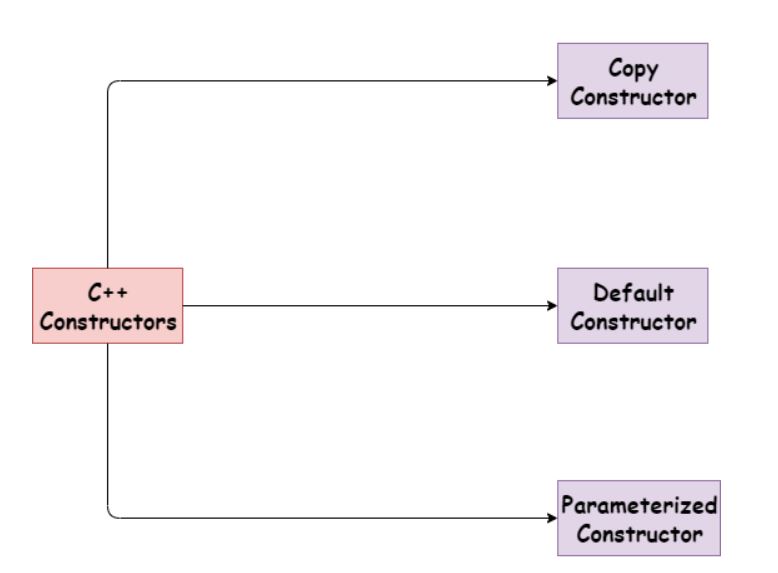Constructors in C++
In this tutorial, we are going to learn about constructors.
Constructor is a special member function of a class, which is executed
whenever we create new objects of that class.
A constructor have a very different syntax as compared to other
member functions.
class students {
public:
// create a constructor
students() {
// code
}
};
You may have noticed in the above code that the constructor have
same name as its class i.e students .
Also a constructor don’t have any return type, not even void .

Default constructor
A default constructor do not contain any parameters, like the
constructor student() in the above example.
Following example shows how a default constructor invoked.
Example:
#include
using namespace std;
class students
{
public:
students()
{
cout<<"Default Constructor Invoked"<<endl;
}
};
int main()
{
students s1,s2;
return 0;
}
Output:
Default Constructor Invoked
Default Constructor Invoked
Explanation:: in above example, we have a default constructor
students(), having a line of code in it. When we created two objects s1
and s2 in main(), the constructor got automatically called and executed
two times without being called explicitly.
Parameterized Constructor
In C++, we can also have parameters in a constructor known as
Parameterized constructor.
Look at the following example
Example:
#include <iostream>
using namespace std;
class students {
public:
string name;
int roll_no;
char grade;
students(string n,int r, char g)
{
name = n;
roll_no = r;
grade = g;
}
void display()
{
cout<< name <<" "<< roll_no<<" "<< grade<< endl;
}
};
int main(void) {
students s1 =students(Sonoo,89,'A');
students s2=students("Monoo",50,'B');
s1.display();
s2.display();
return 0;
}
Output:
Sonoo 89 A
Monoo 50 B
in above example, the constructor students is now parameterised
hence we can pass values in it and get the result without calling them
explicitly, just by creating objects.
Note:If we have not defined a constructor in our class, then the C++
compiler will automatically create a default constructor with an empty
code and no parameters.
Copy Constructor
A copy constructor is a member function which initializes an object
using another object of same class.
The syntax for copy constructor is given below.
class students{
... .. ...;
public:
students(students &obj){ //copy constructor
... .. ...;
}
};
Syntax:
className targetObject(sourceObject);
or
className targetObject=sourceObject;
lets understand it with help of an example.
Example:
In this program, we have a parameterized constructor and a copy
constructor.
class students{
int roll_no;
char grade;
public:
students(int a, char b){ //parameterized constructor
roll_no=a;
grade=b;
}
students(students &t){ //copy constructor
roll_no=t.roll_no;
grade=t.grade;
}
int display(){
cout<<"roll no : "<< roll_no << endl;
cout<<"grade : "<< grade<< endl;
return 0;
}
};
int main(){
cout<<"parameterized constructor"<< endl;
students s(12,'A');
//object created and value passed to parameterized constructor
s.display();
cout<<"copy constructor"<< endl;
students c(t);
//object created and value passed to copy constructor
c.display();
return 0;
}
In this program , first we are passing values to parameterized
constructor by creating an object, S. then we are passing the same
object to a copy constructor by creating its object, C. Hence, values of
object S got copied in C.
Output:
parameterized constructor
roll no : 12
grade : A
copy constructor
roll no : 12
grade : A
When we need copy constructor ?
In C++, a Copy Constructor may be called in following cases:
- . When an object of the class is returned by value.
- When an object of the class is passed (to a function) by value as an
argument.
- When an object is constructed based on another object of the same
class.
- When the compiler generates a temporary object.

